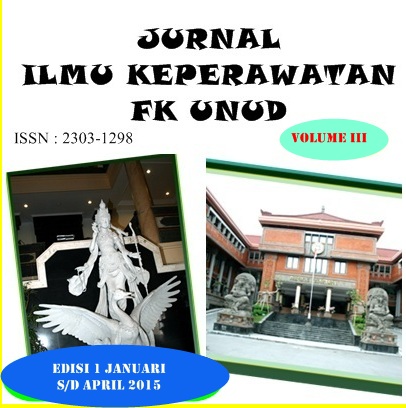HUBUNGAN KOMUNIKASI, SUMBER DAYA, SIKAP DAN STRUKTUR BIROKRASI TERHADAP PENERAPAN CLINICAL PRIVILEGE PERAWAT
Abstract
Giving a clinical privileges to a nurse aims to protect patient safety by ensuring that nursing personnel who provide nursing care have clinical competence and clear authority. Good implementation of clinical privileges is essential to avoid conflicts arise among health workers. Conflicts that arise will certainly affect the quality of service of nurses and hospital concerned. The aim of this study is to identify correlation communication, resources, disposition and bureaucratic structure with the implementation of clinical privilege of nurse in Inpatient Unit and Emergency Unit BRSU Tabanan. The method of this research is analytic correlation with cross sectional design. Samples were 70 people who come through proportional random sampling technique. The data was found by a questionnaire about factors that affect the implementation of clinical privilege of nurse, such as communication, resources, attitudes and bureaucratic structures. The results of the data analysis showed that the correlation coefficient of communications r = 0.336 and p = 0.003, resource r = 0.666 and p = 0.000, attitude r = 0.575 and p = 0.000 and bureaucratic structure r = 0.538 and p = 0.000. With a confidence level of ? = 0.05 and all p values < ? showed that between communication, resources, attitudes and bureaucratic structures have significant correlation to the implementation of clinical privilege of nurseDownloads
Download data is not yet available.
Published
2015-01-05
How to Cite
LESTARI, Ni Nyoman Rita.
HUBUNGAN KOMUNIKASI, SUMBER DAYA, SIKAP DAN STRUKTUR BIROKRASI TERHADAP PENERAPAN CLINICAL PRIVILEGE PERAWAT.
Coping: Community of Publishing in Nursing, [S.l.], v. 3, n. 1, jan. 2015.
ISSN 2715-1980.
Available at: <https://ojs.unud.ac.id/index.php/coping/article/view/10828>. Date accessed: 04 feb. 2026.
Section
Articles
Keywords
clinical privilege; authority implementation







